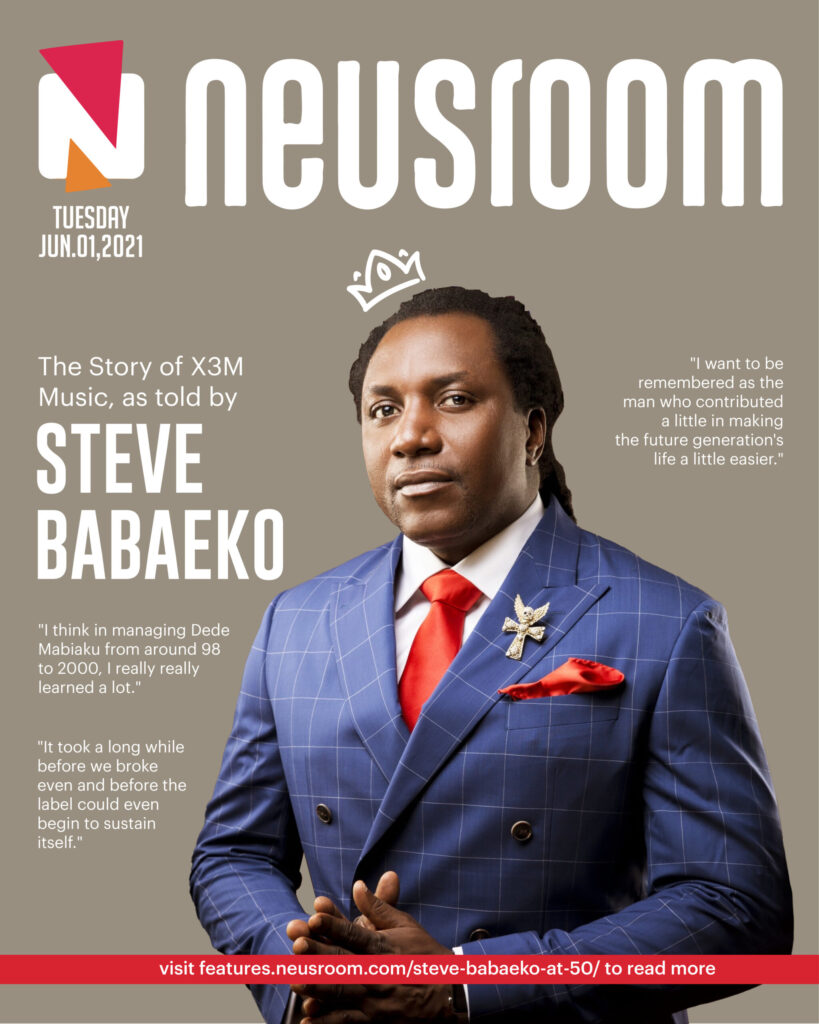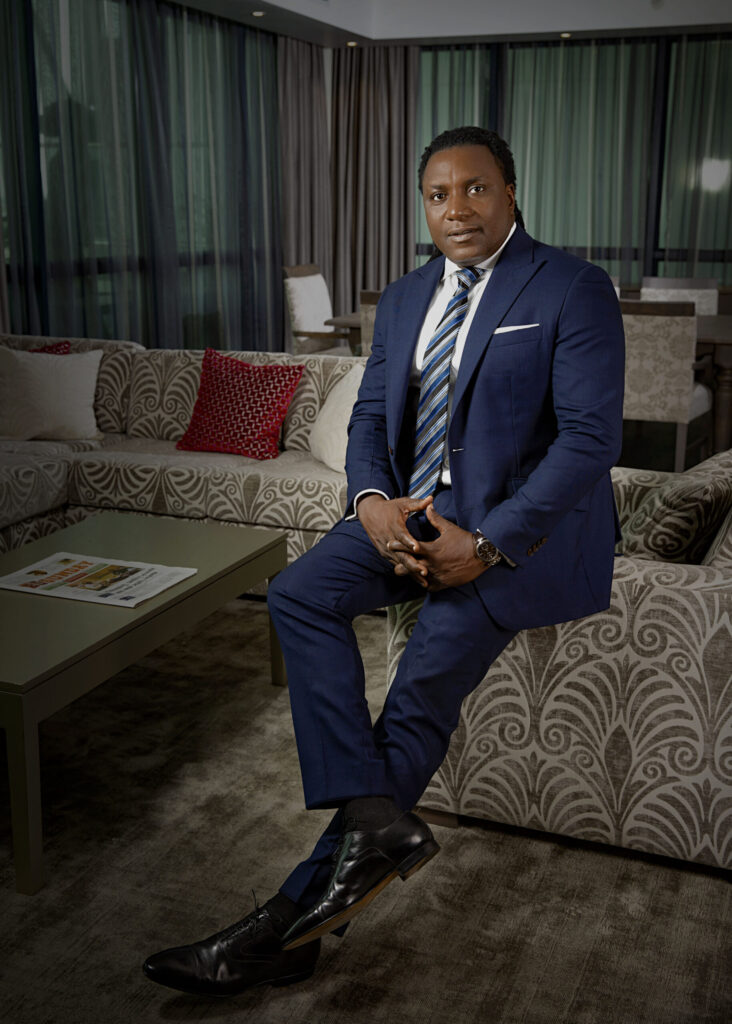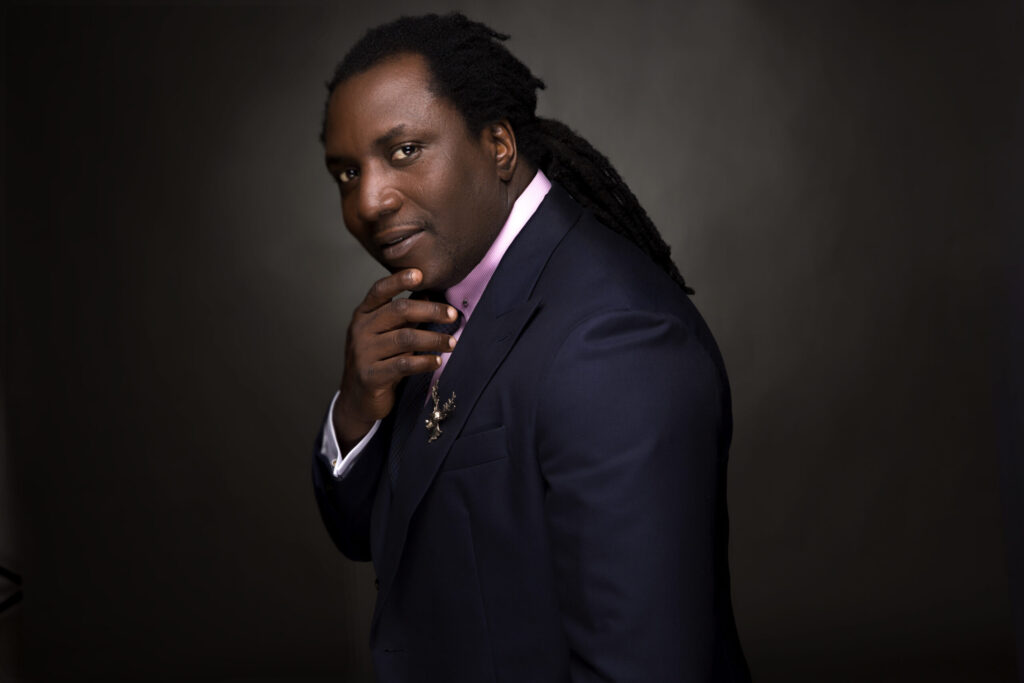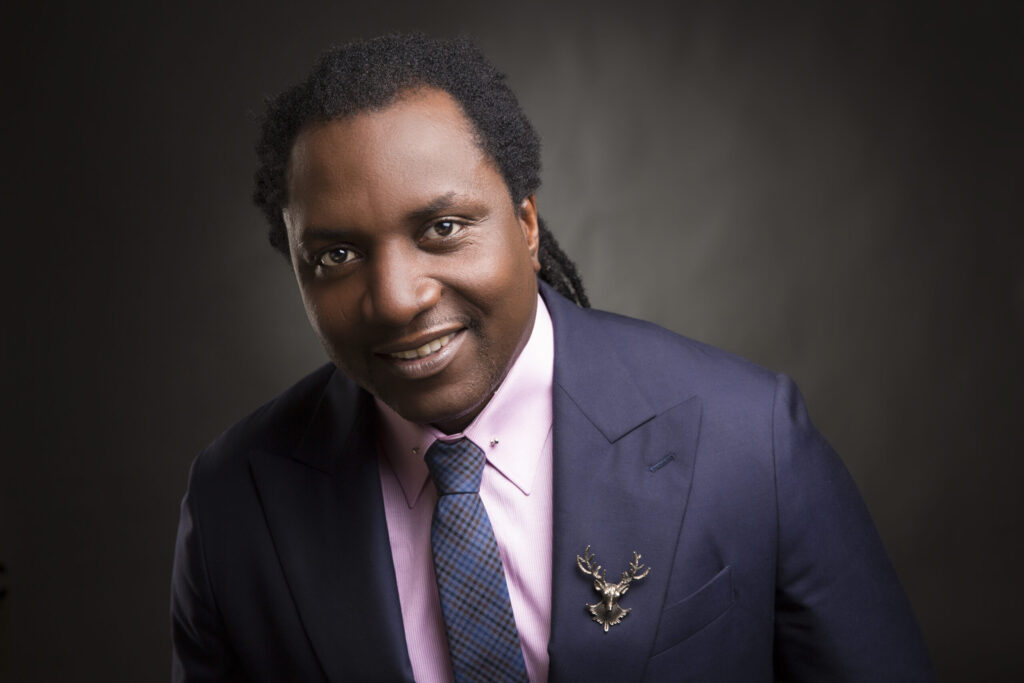The Story Of X3M Music, As Told By Steve Babaeko
On his 50th birthday, Steve Babaeko tells Neusroom’s Mofijesusewa Samuel all there is to know about his failed music career, his journey into the music business, and how X3M Music could lead Nigerian entertainment into the future.

01 June 2021
Q: What made you fall in love with music in the first place?
Apart from the misadventure of thinking I could be a musician in the early days of forming a band with some of my friends far back in high school, I’ve always loved music. Of course, my mum was not having it because one day she called me and said, ‘sit down’. She said she has a question for me, and she wants me to think carefully. She said, ‘look at your father’s side, everybody on your father’s side’; I said yeah. She said, ‘how many musicians do you know there?’ I said none. She said, ‘look at my own family, how many musicians do you know?’ I said none. She said, ‘so you are not going to be a musician’. I think she did us a national service. She deserves a national honour for that because I’m sure I can’t sing to save my life, so I don’t even know what I was doing at the time.
But when I came to Lagos, I remember I met Dede Mabiaku. Someone introduced me to him around 96/97. I think Fela had just passed then. He was devastated because he was always all over the place with Fela in the last ten years of Fela’s life, opening shows for him, even abroad and stuff. So when Fela passed, he was inconsolable. So a lot of his friends… and I knew one of his friends, Pappy. Through Pappy, we became very close to Dede Mabiaku. So he’d come to the agency I was working in as a copywriter then. He had a manager – one of those Island big boys was his manager when he finally set up his band after Fela passed.
I think he was running for like a year. We used to go for his gigs and everything. And then one day he just drove to the office, and he was in a foul mood, and I asked, ‘bros wetin happen?’ And he said that he had parted ways with his manager. I was like, ‘wow! That’s serious. So what are you going to do now?’ He just looked at me and said, you’ll start managing me. I was like, I don’t know two flying monkeys about music. He just told me you’ll learn, and that’s it. And I think in managing Dede Mabiaku from around 98 to 2000, I really really learned a lot. I think that really threw me in the deep waters of where music happens in Lagos, and I met almost all the players. And then I now started seeing all of the gaps in management, structure, distribution, and all of those things. That’s how I got into music.
 “I think in managing Dede Mabiaku from around 98 to 2000, I really really learned a lot.” Photo: Yetunde Ayeni-Babaeko.
“I think in managing Dede Mabiaku from around 98 to 2000, I really really learned a lot.” Photo: Yetunde Ayeni-Babaeko.
Q: Between 2000, when you stopped managing Dede Mabiaku and 2008, when you created X3M Music, did you do any other thing with the music community?
I’ve always been the guy who just wanted to work. I wanted to earn as much money as I could. So whatever talent I had, I was quick to put it to use and earn any kind of legitimate money that I could. So, while I was a copywriter, I was also a show producer. I was a stage manager for big events like the Miss Commonwealth Beauty Pageant. I was stage managing shows for Guinness. I was stage managing shows for Fanta – a lot of stage management and shows.
I made quite a decent amount of money. So I had like Trybesmen and all of the prominent artistes. Plantashun Boiz – I was managing their shows, Daddy Showkey, Father U-turn – all of the guys that were the big guys at that time. I was constantly meeting them at shows because I was the stage manager. I was the guy who was producing all of the shows that were making things happen. I kept on doing all of that in-between.
What day exactly did you set up X3M music?
It’s 2008, but I don’t remember it unless I check. I can’t remember, but I had a boss, my former boss, who ran the agency I was working at the time. He used to hear me talk about music from around the late 90s. I used to talk about music becoming the next big thing in Nigeria. How it was going to earn so much money and how music is the future. That was my refrain at every given opportunity to talk. But one day, my boss called me and said, ‘Steve, you are always going on and on about music. Do you know I own shares in Premier Records? I was so excited because Premier meant a heritage record label and a huge catalogue for me. I knew of Premier. He said, ‘but we are not making the kind of money I hear you talk about’. So I said, if you are not making money, I understand because Premier can do many things to just perch on the wings of business and catch the small wind in their shell. He said, okay, can I put up a proposal, a document that he can present to the board at the next board meeting headed by Jimi Agbaje.
I put up my proposal, and I went to explain it to their board. My request was – I have a three-year plan in this document that can turn around the fortune of Premier records. I wanted to be paid 5 million Naira, and I wanted to get paid one part of that money each time I hit a milestone. They would pay the money in threes. Eventually, I got a counter proposal from the management saying they don’t have that kind of cash flow, but they like my ideas. They asked if I’d accept to be paid 250,000 instead. I just politely declined because I just didn’t see the correlation between 5 million Naira and 250,000
But it kept me up all night for many days as I wondered why you would ask for 5 million, and someone will counter with 250,000. Then I found the answer in my heart. Well, it’s obvious – your proposal looks nice on paper. But where have you done the kind of stuff that you say is possible in your document that will make them trust you and believe that those things you say they should do can be done? I think the next day was when I registered X3M music. I just called up my lawyer to register a record label. I just wanted to show that those things could actually be done – you just need to apply your heart to it and persevere. That really was the trigger point for registering the business, but I really can’t remember exactly. I need to go and check my archives.
 “I just wanted to show that those things could actually be done – you just need to apply your heart to it and persevere.” Photo: Yetunde Ayeni-Babaeko.
“I just wanted to show that those things could actually be done – you just need to apply your heart to it and persevere.” Photo: Yetunde Ayeni-Babaeko.
How did your wife take it when you said, ‘I’m going to register a record label’?
My wife knows that as an entrepreneur, I’m always looking for sweet spots and opportunities. I’m just always thinking, is there any industry I can add value to? So if there’s value to be added somewhere, she knows I’m going to give it a shot. She already knows who she got married to that I’m always an adventurer when it comes to business. I always want to push and see where the next road will lead to. Ultimately, it’s because she’s also a creative person and understands that I just want to explore my creativity and do certain things, so she’s always supportive.
Who was your first signee, and how did that even happen?
I think I signed Ade Bantu, and I can’t even… Again, it’s one of those moments that is still lost in history. I really can’t remember exactly what date we met and where we met, but I just know we got talking. Bantu had this massive single blowing up in Nigeria, and Kenny Ogungbe strongly supported them on AIT Jamz. They were becoming significant in Nigeria when I met him.
Bantu was a group in Germany, but Ade was the only one who had the inspiration to come back to Nigeria. So we met, and I signed a joint venture deal with him.
At what point did you start signing other people?
I signed Etcetera in 2008, shortly after Bantu. He was an afro-fusion/rock artiste. In between, I signed a management contract with Nneka covering Africa, but we didn’t work together for too long. I think somehow, we both had to mutually stop the contract at some point. And then I now signed Overdose. I’ve always been a big fan of hip-hop, so I just felt like Overdose was it for me. I still think he’s one of the most gifted lyricists in the country. So naturally, we put him on and did one record called ‘hustle or die’. And then I signed Praiz in 2010, I think. He was fresh off Project Fame. And then, I signed Simi and Sammie in 2014. And then I signed D-Truce as well, the rapper. He was with us briefly. And then I signed Dapo. That was the last person we signed.
 “I’m not easily swayed by the flavour of the month, all the pop stuff going on. No! I want music with a bit of more longevity built into it.” Photo: Yetunde Ayeni-Babaeko.
“I’m not easily swayed by the flavour of the month, all the pop stuff going on. No! I want music with a bit of more longevity built into it.” Photo: Yetunde Ayeni-Babaeko.
Would you say you have a soft spot for Hip Hop, and you usually connect better with hip hop artistes?
Yes, I love hip hop. Till now, I’m still a big fan of the genre. It works for me. It comes easily to me. And maybe because I’m a copywriter, all the wordplay, I can see it. I can appreciate it more, so I connect to hip hop a lot. And then because of even the culture, the culture that gave birth to hip hop – that street culture; some of us grew up on that street. So even though we’ve since moved away from the street, I can still say there’s still a bit of the street inside me somewhere. So it makes it easier for me to connect as well. But when it comes to the music itself, I gravitate without even thinking to more music in the alternative genre. I’m not easily swayed by the flavour of the month, all the pop stuff going on. No! I want music with a bit of more longevity built into it. Something that you can hear in another 20 years and still be enthralled by it. If you see from even the Bantu, Nneka, to Simi, Praiz, you’ll see that they are not people in the mainstream. They are usually people some classify as alternative artists.
How would you describe the journey for X3M music since you began? How have things been over time?
It took a long while before we broke even and even before the label could even begin to sustain itself. Because one thing most people don’t understand is that if music is not driven by passion, you can’t even do it in Nigeria. Because if you are expecting one big money somewhere, e go shock you! For me, I knew this anyway, but we love the culture; we love the industry. I just felt let me contribute my own quota.
But after a while, I think from about 2014, we started stabilising, and now we have a few catalogues. So that whether we release a new artiste or not, at least the label can still make money from the catalogue we have. We are doing more project-based stuff now. It’s been challenging because of the peculiarities of the Nigerian music industry. And because of all of the deficiencies in structure and lack of financial support. Most of the financial sector still doesn’t know how to engage the music industry regarding providing financial support. So most of the things you do, you have to find a way to bootstrap and fund yourself. So those are part of the challenges that we still contend with.
 “I think my most outstanding achievement is just participating and contributing our little quota to the industry.” Photo: Yetunde Ayeni-Babaeko.
“I think my most outstanding achievement is just participating and contributing our little quota to the industry.” Photo: Yetunde Ayeni-Babaeko.
You said that you are doing more project-based stuff now. What would that entail or mean generally?
There’s a project we are working on now that I can’t talk too much about. Maybe when that project comes out, people can see that we pivoted from just signing new talents. Because I can tell you that signing new talents is good, but I don’t think that is the future of music. Because if you notice now, artistes want to do stuff by themselves – which should be encouraged. It’s a good thing. As a label, you are the one holding the short end of the stick from day one.
If you think the brand is going to survive off putting an artiste on. One, I don’t even believe in holding the talents to like long, elaborate contracts. I just think it’s not fair. So even if you sign a 7-year contract with someone (which I believe to be way too long), before you begin to make money back off a talent, maybe you are in the fifth or sixth year. Then perhaps you start to break even. And then, before you know it, the seventh year is up, and the talent has the right to move on. So how do you recoup your money? It’s not the fault of the talent or the fault of the label. It’s just the peculiarities of the structure of the industry itself. This is why smart labels now will go into more alternative sources of generating income instead of just putting everything on signing new talents.
Would you change anything about the process X3M Music has been through?
No, at all. I love the process. I love the story. I love the fact that we’ve been able to add value to the lives of some young Nigerians who have now grown really massive, and they’ve brought pride to this country. I mean, if that’s our contribution, then it’s something to be happy and excited about. So I wouldn’t change anything.
Steve Babaeko is more than just a music executive. Artistically, it is almost impossible to box him in one space.
 “I love the fact that we’ve been able to add value to the lives of some young Nigerians who have now grown really massive, and they’ve brought pride to this country.” Photo: Yetunde Ayeni-Babaeko.
“I love the fact that we’ve been able to add value to the lives of some young Nigerians who have now grown really massive, and they’ve brought pride to this country.” Photo: Yetunde Ayeni-Babaeko.
What two things would you change from the Nigerian Music industry right now?
I’ll try and see if I can bring the financial industry to come and sit at the table and look for ways to structure more financial support for the industry. Honestly, I know Nigerian youths are very creative and very industrious. With little or no support, look at what they’ve made of the Nigerian music industry. They’ve exported it to the world and conquered the world, as a matter of fact. If they have much more financial support, they can do a lot. If that’s the only thing we can solve, it will be a major problem solved.
The second thing will be more structure because lately, we’ve had to clean up internally to create more sustainable systems around the business. Because what you see now is that Foreign labels have taken over again, signing the Nigerian talents and paying a lot of money. They have that deep pocket to be able to spend money. If we are not careful, the local industry will die again in another three or four years. This was the situation before Kenny Ogungbe, D1, Obi Asika, Storm, and Chocolate City. All those guys came and revived the industry. We will go back to another situation where the local industry will die again if we are not careful.
Honestly, for someone that’s invested a lot and has a lot of sweat equity in this industry, we would not want to see that happen.
Apart from the music industry, is there any other thing you do (not as X3M) but as Steve Babaeko for the entertainment industry? Do you play in other aspects of the Creative sector apart from music?
In the entertainment industry – part of our group, we have a production company called Zero Degrees. Recently, we shot a documentary called ‘Awon Boyz’ that ended up on Netflix. It was number three on Netflix Nigeria on the chart. I think for us, that’s just the beginning of a lot of production. We are working on a comedy series that will kick off by the third quarter of this year. By 2022, we are coming up with a feature film. Movies are also the next place we are venturing into now.
It looks like you are about to take the industry by storm.
We are the storm in the industry now because we’ve done a lot. It’s just that we just don’t usually stomp our chests a lot. But I know quietly people know that we’ve been contributing over the years and we’ll continue to do so.
 “I just want to be remembered as the man who contributed a little quota in making the future generation’s life a little easier.” Photo: Yetunde Ayeni-Babaeko.
“I just want to be remembered as the man who contributed a little quota in making the future generation’s life a little easier.” Photo: Yetunde Ayeni-Babaeko.
What would you say has been your most outstanding achievement in the industry?
I think my most outstanding achievement is just participating and contributing our little quota to the industry. I feel very privileged to do that. And being able to just open doors to the new crop of Nigerians who can use the platform to become somebody great in life. Like I tell people, those of us who have the good fortune of living on the positive side of life – there’s this feeling we usually have to say ‘no, I shouldn’t have to open the doors, some other person will open it’. We don’t think about the guys on the Boko Haram and kidnappers side of town who are also trying to open the doors to the next generation of people who will take over from them. If you feel like somebody else will do it, and you don’t do anything for this next generation, trust me, these other guys are going to open the door. The guys that God has helped us put on will never be armed robbers or kidnappers because they have known names. They’ve become successful. They’ve become known faces, and they can’t even be that even if they wanted to. By the grace of God, they can never even be that. For me, that’s a huge privilege that we can do that.
What’s the future looking like for X3M music?
The next big thing we will do is this thing that I can’t talk about. Once that project sees the light of day in another couple of months, you’ll know where the future of X3M music is turning towards. I can imagine that many people will take a page off our playbook once we get out with the program.
If it all ends today, what do you want your legacy to be?
I just want to be remembered as the man who contributed a little quota in making the future generation’s life a little easier. This industry is a challenging industry to be in. My heart goes out to millions of Nigerian youths trying to find a future in the Nigerian music industry. It’s a very tough industry to play in. You cannot solve the problems of everybody. But I just want to be known as the man who contributed a little in making the lives of the youths trying to make it in this industry a little easier.


[7] He was also a judge on the 2017 The Loerie Awards [20] [21] [22] [23] Babaeko is involved in a couple of social advocacy activities, including pushing for the recognition of Obangogo Hills, a symbolic cultural and tourist location in Kogi State of Nigeria, [24] [25] [26] standing over 700 metres high, as a UNESCO World Heritage Site. [27] [28] [29] His last name, Babaeko, was given to his grandfather by his great-grandfather to honour a Lagos-based lawyer whose presence in Kabba at an auspicious time helped him win an important court case. [30] Babaeko means “father from Lagos”.